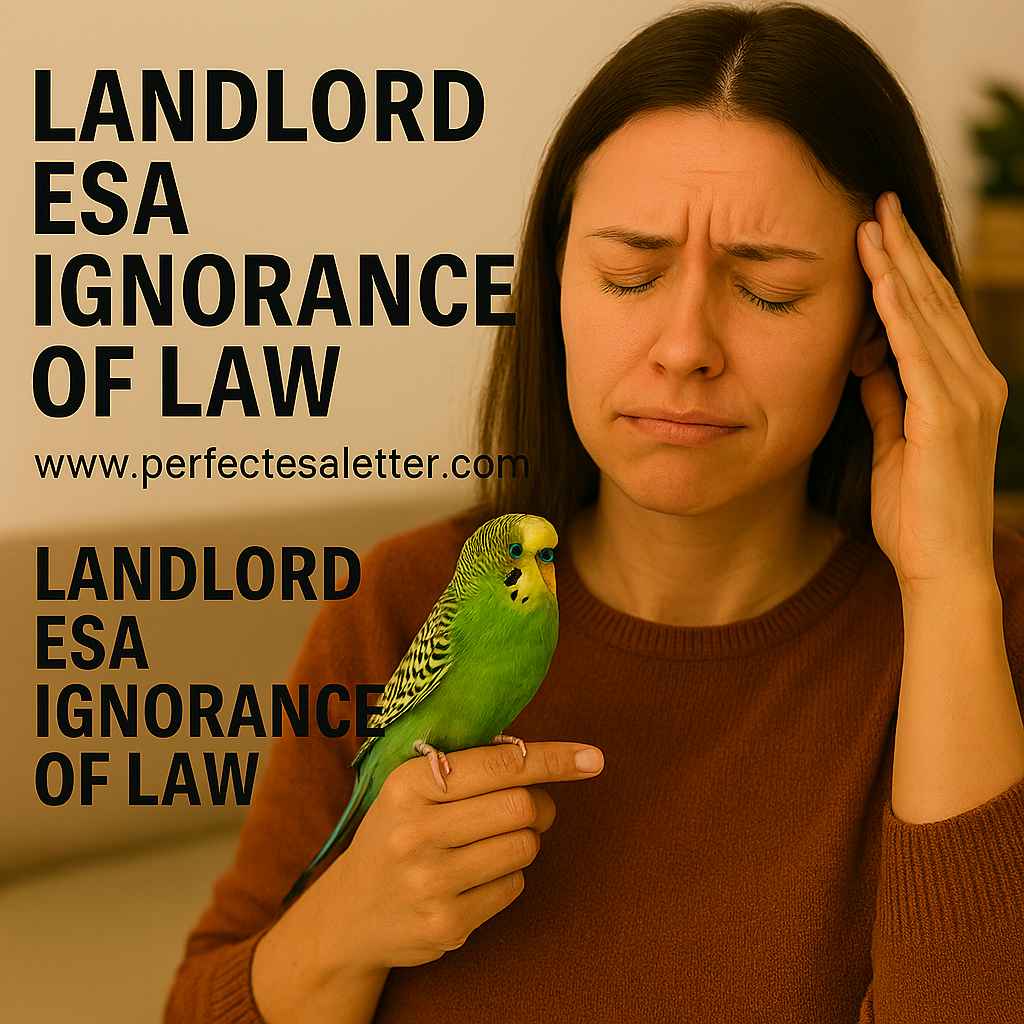Dealing with a Landlord’s Ignorance of ESA Laws
Article
Introduction
Emotional Support Animals (ESAs) play a critical role in supporting individuals with emotional or mental health conditions. Federal law, particularly the Fair Housing Act (FHA), protects ESA tenants by requiring landlords to provide reasonable accommodation.
However, some landlords are unaware of ESA regulations and unintentionally violate tenants’ rights. Understanding how to handle a landlord’s ignorance of ESA law is key to protecting your housing and ensuring your ESA is accommodated.
What Does “Landlord ESA Ignorance of Law” Mean?
Landlord ESA ignorance of law refers to situations where a landlord:
- Does Not Understand ESA Protections
- Failing to recognize that ESAs are not considered pets under federal law.
- Misapplies Lease Terms
- Enforcing “no-pet” clauses against tenants with valid ESA letters.
- Ignores Legal Obligations
- Denying ESA requests, charging illegal fees, or delaying approvals due to lack of knowledge.
- Misunderstands Tenant Rights
- Treating ESA tenants unfairly or retaliating against lawful ESA accommodation requests.
Important: Ignorance of the law does not excuse violations. Landlords are legally required to comply with ESA regulations.
ESA Tenant Rights When Facing a Landlord’s Ignorance
- Right to Reasonable Accommodation
- Landlords must provide ESA accommodations regardless of their understanding of the law.
- Protection Against Discrimination
- ESA tenants cannot be penalized, fined, or evicted for having a valid ESA.
- Right to Educate the Landlord
- Tenants can provide legal references, ESA documentation, and educational resources to ensure compliance.
- Right to Legal Recourse
- If the landlord continues to violate ESA laws, tenants can file complaints with HUD or pursue legal action.
Steps to Handle Landlord ESA Ignorance of Law
- Provide Valid ESA Documentation
- Submit a letter from a licensed mental health professional stating the need for the ESA.
- Communicate Professionally
- Politely explain the laws that protect ESA tenants, referencing the Fair Housing Act and any applicable state regulations.
- Document All Interactions
- Keep copies of emails, letters, notices, and communications for future reference.
- Provide Educational Resources
- Share official HUD guidance or state housing authority publications on ESA rights.
- Follow Up in Writing
- Confirm understanding and request written acknowledgement of ESA accommodation.
- File a Complaint if Necessary
- Contact HUD or a local fair housing agency if the landlord refuses to comply despite education and documentation.
- Seek Legal Assistance
- A tenant rights attorney can intervene if the landlord continues to ignore ESA laws or violates your rights.
Tips to Prevent Problems from Landlord Ignorance
- Provide Verified ESA Letters – Strong documentation clarifies the need for accommodation.
- Communicate Early – Inform landlords about your ESA before signing the lease.
- Maintain ESA Behavior – A well-behaved ESA reduces objections from landlords.
- Keep Records – Document all communications, approvals, and complaints.
- Know Your Rights – Understanding the Fair Housing Act and ESA protections allows you to educate landlords effectively.
Real-Life Example
Sophia, an ESA tenant with anxiety, encountered a landlord who denied her ESA request due to a strict no-pet policy.
Sophia submitted her valid ESA letter, cited HUD guidance, and explained her legal rights under the Fair Housing Act. After reviewing the information, the landlord acknowledged their ignorance of ESA law and approved the ESA accommodation.
This demonstrates that ESA tenants can resolve issues stemming from landlord ignorance through education, proper documentation, and professional communication.
FAQs
Q1: Can a landlord’s ignorance of ESA law excuse violations?
👉 No. Landlords are legally obligated to comply with ESA and housing laws, regardless of their knowledge.
Q2: What should I include when educating a landlord?
👉 Provide ESA documentation, cite HUD and Fair Housing Act guidance, and clarify your rights clearly and professionally.
Q3: What if the landlord still refuses?
👉 File a HUD complaint or consult a tenant rights attorney to enforce your ESA accommodations.
Q4: Can ignorance lead to illegal fees or fines?
👉 Yes. ESA tenants cannot be charged pet deposits, pet rent, or fines based solely on ESA ownership.
Q5: Should I maintain records of all communications?
👉 Absolutely. Documentation protects your rights and helps resolve disputes.
Conclusion
Landlord ESA ignorance of law can create unnecessary challenges for ESA tenants. By providing valid ESA documentation, educating the landlord, documenting interactions, and involving HUD or legal counsel if needed, tenants can protect their rights and ensure their emotional support animals are accommodated.
Being proactive and informed helps ESA tenants navigate misunderstandings, prevent violations, and secure housing in compliance with federal and state ESA laws.
”Get Yours Now!
Don’t wait until a landlord or airline tells you “no pets allowed.” Protect your rights today.
Please fill out this form and our team wil contact you ASAP.
Complete your assessment in minutes , get approved by a licensed professional, and receive your letter within 24 hours.

